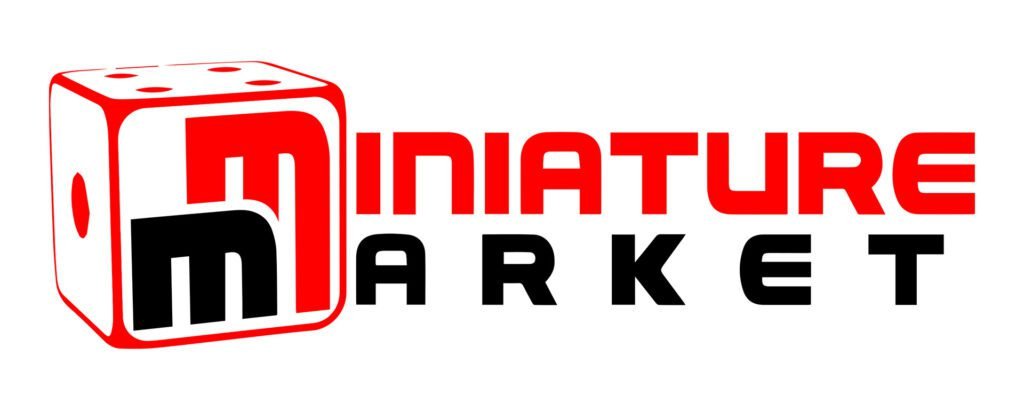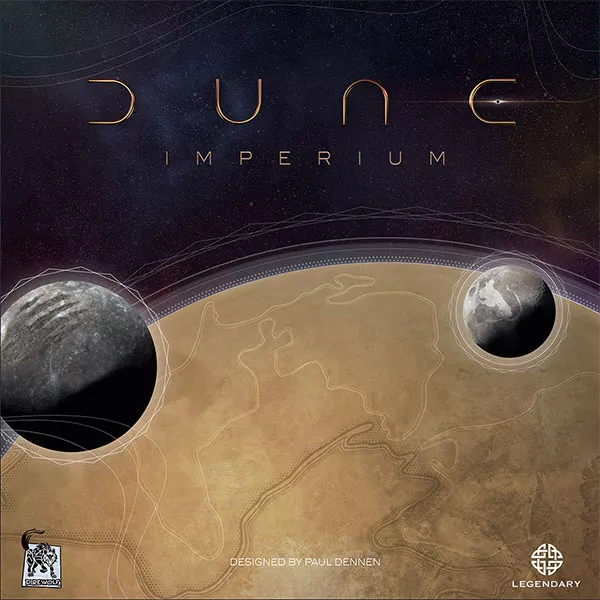
Today we’re diving into “Dune: Imperium.” This is a board game from Dire Wolf, based on Frank Herbert’s iconic science fiction novel. So, let’s break it down – what it is, what’s good, what’s bad, & if you should pick it up. Let’s get into it.

What It Is
“Dune: Imperium” is a strategic board game designed by Paul Dennen for 1-4 players, blending deck-building & worker placement mechanics. Set on the treacherous desert planet of Arrakis, players compete to become the most influential force in the galaxy by controlling the precious spice melange & currying favor with powerful factions. The game typically takes 60-120 minutes to play, depending on player count & experience.
Gameplay Overview
In “Dune: Imperium”, you assume the role of one of the great houses of the Imperium, vying for control over the precious spice melange, found only on the desert planet Dune. As you maneuver through political intrigue, strategic alliances, & brutal combat, your ultimate goal is to outmaneuver your rivals & achieve dominance, with the winner being the player who earns the most victory points by the end of the game.
To set up the game, players place the game board in the center of the play area & prepare various decks, tokens, & player components. This includes setting up the conflict deck, which is divided into three shuffled piles based on their stage in the game, & arranging the intrigue cards & the imperial deck. Players then choose their leaders, who each have varying levels of strategic complexity, & organize their starting decks accordingly. Each player selects a color, sets up their agents, counselors, & combat markers, & distributes influence cubes on the board. If playing with fewer than four players, there are additional setup steps found on a separate sheet.
The game is played over a series of rounds, each divided into five phases. The first phase is the round start, where players reveal the top card of the conflict deck to see the potential rewards for the upcoming combat phase. Each player then draws five cards from their personal deck. The second phase is player turns, where players take either an agent turn or a reveal turn. On an agent turn, a player plays a card from their hand, using the icons on the card to send an agent to a corresponding space on the board. If they have no agents left, they must take a reveal turn instead, which ends their participation in that phase.
During an agent turn, players send their agents to various board spaces to gain resources, recruit troops, or increase influence with one of the four factions. Some spaces allow players to recruit troops & send them into the conflict area, where they will battle for rewards. The more troops a player has in the conflict, the better their chances of winning & claiming valuable rewards from the conflict card. However, not all spaces are combat spaces, & players must carefully choose when & where to deploy their troops.
Influence is crucial in Dune: Imperium. By assigning agents to faction-related spaces, players move their influence cubes up the faction tracks. Reaching higher levels of influence can earn victory points & special bonuses, such as intrigue cards or control over faction alliances. The first player to reach the top of a faction’s influence track secures the alliance token, gaining an additional victory point. However, this token can be stolen if another player surpasses their influence.
Finally, during a reveal turn, players reveal all the cards they have left in their hand, resolving any reveal effects & adding up their persuasion points. Persuasion points can be spent to acquire new cards from the Imperium Row or reserve, enhancing their deck for future rounds. This deck-building element is key to improving a player’s capabilities over the course of the game, allowing for stronger plays & more effective strategies as the game progresses.
By carefully managing resources, forging strategic alliances, & mastering the delicate balance between deck-building & board control, players will find themselves immersed in a tense & dynamic struggle for supremacy in the world of Dune. Victory goes to the player who can best navigate the complexities of the Imperium & claim the most victory points by the end of the game.
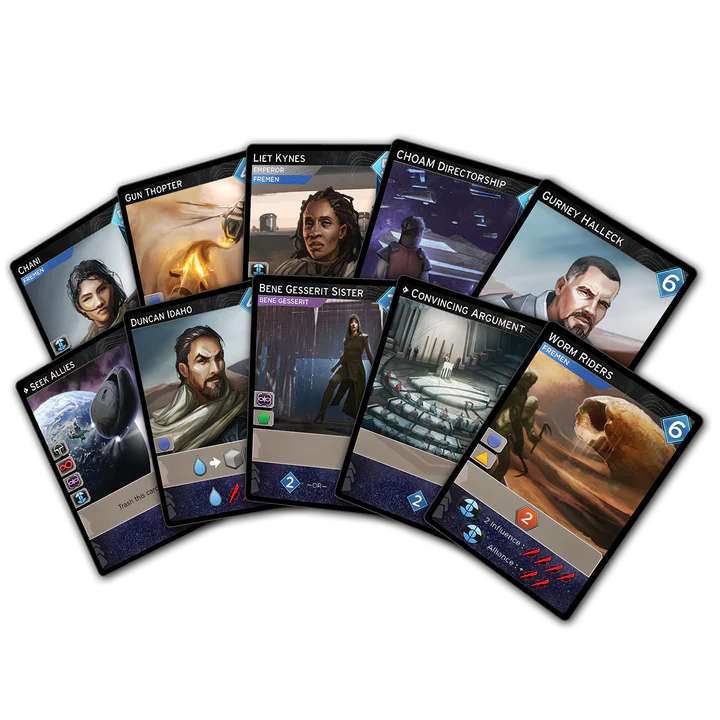
The Components
“Dune: Imperium” shines in its production quality. The chunky, colorful resource tokens for spice & water are a tactile pleasure, while the board’s artwork vividly evokes the harsh Arrakis landscape. The game’s iconography is generally clear & intuitive, although some thematic elements occasionally introduce minor rule exceptions that can be slightly confusing for new players.
The game plays best with two or three players, where turns flow smoothly & downtime is minimal. A clever system using a separate deck simulates a third faction in two-player games, maintaining board tension without much added complexity. However, with four players, the experience can become somewhat stretched, as the board fills up quickly, limiting available options.
The Good
“Dune: Imperium” excels in blending its deck-building & worker placement mechanics, creating a rich, strategic experience. The constant balancing act between different strategies – courting factions, building your deck, timing your battles – adds a layer of tension that’s deeply satisfying. The game does an excellent job of capturing the political intrigue & resource struggles that define the Dune universe.
The production quality is another highlight. The components are well-crafted, & the artwork perfectly captures the theme, drawing you into the harsh, unforgiving world of Arrakis. The tactile nature of the resource tokens, combined with the clear & thematic iconography, enhances the overall experience.
The game’s pacing is well-tuned, especially at lower player counts. The way it handles a third faction in two-player games is particularly clever, ensuring that the game remains engaging without bogging down in complexity.
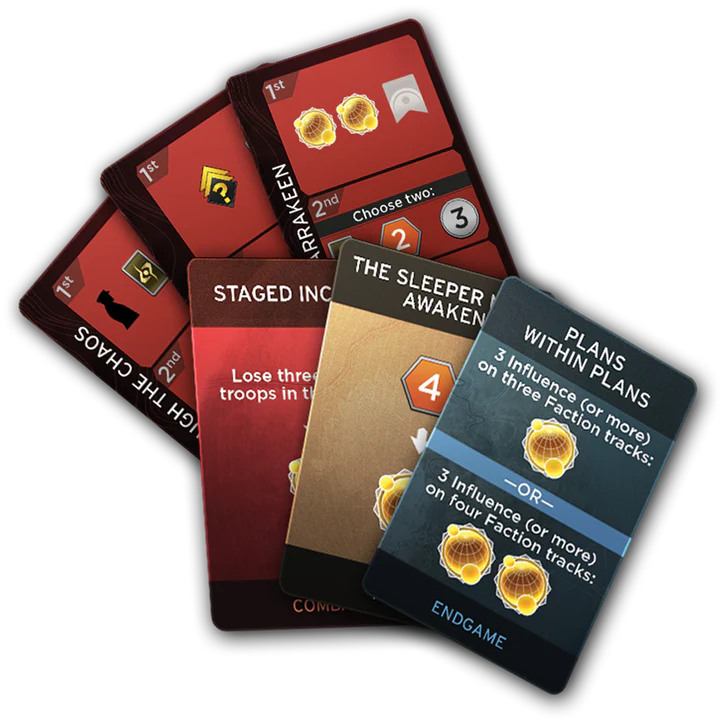
The Bad
Despite its strengths, “Dune: Imperium” isn’t without its flaws. Some players might find the deck-building options more limited compared to dedicated deck-builders like “Dominion.” While the market of new cards provides some variety, it might not offer the same depth that fans of the genre might expect.
The game’s length can also be an issue, particularly in digital implementations where the pace can drag. Additionally, while the rulebook isn’t terrible, it has some ambiguities that might require you to look up clarifications online.
At higher player counts, the game can feel a bit stretched, with fewer options available as the board fills up quickly. This can lead to increased downtime & a sense of frustration as players struggle to find meaningful actions.
The Verdict
So, should you buy “Dune: Imperium”? If you’re a fan of the Dune universe or enjoy games that mix deck-building with worker placement, the answer is a strong yes. The game captures the essence of its source material, offering a tense, strategic experience that rewards repeated plays.
For those who enjoy political maneuvering, resource management, & a dash of combat, “Dune: Imperium” is a compelling addition to your collection. Its blend of familiar mechanics with the rich Dune setting creates an engaging experience that’s greater than the sum of its parts.
However, if you’re looking for a deep deck-building experience or a game that plays smoothly at higher player counts, you might want to consider your options. “Dune: Imperium” is best enjoyed with two or three players & might not appeal to those who prefer faster-paced or more streamlined games.
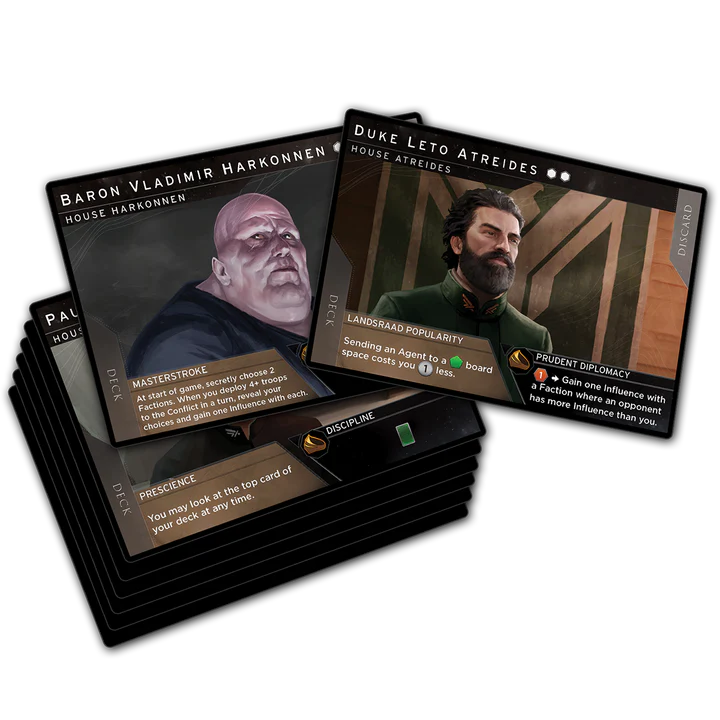
Final Thoughts
When it comes to Dune: Imperium, this game really stands out as a top-tier board game experience. With its unique blend of deck-building & worker placement mechanics, it offers a depth of strategy that keeps you coming back for more. On the surface, it may seem straightforward, but as you play, you quickly realize just how much your decisions matter. Each game feels like a fresh challenge, where every move counts, & that’s what makes it so engaging.
The game’s thematic integration is impressive. Even if you’re not deeply familiar with the Dune universe, you’ll appreciate how well the gameplay reflects the lore. Whether you’re building alliances with the Fremen or maneuvering through political intrigue with the Bene Gesserit, the game does a fantastic job of making you feel like you’re part of the Dune world. The factions are distinct, & their abilities align perfectly with their roles in the Dune saga, making each game feel like an authentic dive into this iconic sci-fi setting.
One of the things I love about Dune: Imperium is how it manages to feel fresh each time you play. The variety of Leaders & Houses you can choose from means that every game can unfold differently depending on the strategies you employ. It’s a game where no single path to victory is guaranteed, & the balance between different strategies adds to the replayability. Whether you’re building a powerful deck or carefully placing your agents, the decisions you make are crucial, & that keeps you on your toes throughout the game.
That said, the game isn’t without its minor issues. The card market can sometimes feel a bit stagnant, especially in solo play, where you might wish for a way to refresh the available options more often. While this isn’t a major flaw, it’s something that could be tweaked to keep the gameplay moving smoothly. Nonetheless, the solo mode is otherwise very well-designed, offering a solid challenge that’s both rewarding & fun. The app integration adds an extra level of polish, making solo play even more enjoyable.
What really sets Dune: Imperium apart is how well it captures the feel of the Dune universe while standing strong as a game on its own merits. The tension of each round, the careful planning, & the strategic depth all combine to create a game that’s not only fun to play but also deeply satisfying. The close games, where victory is often decided by just a few points, add to the excitement & keep you coming back for more.
In the end, Dune: Imperium is a game that I highly recommend, whether you’re a fan of the Dune franchise or just someone who appreciates a well-crafted board game. It’s got depth, replayability, & a strong thematic presence that ties everything together beautifully. If you’re looking for a game that challenges your strategic thinking & immerses you in a richly detailed world, Dune: Imperium should be at the top of your list.
Purchase Options


At no extra cost to you, The Board Game Site may receive revenue from affiliate and advertising partnerships for sharing this content and from purchases through links.



